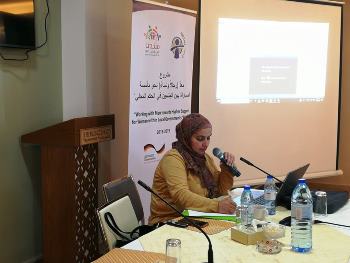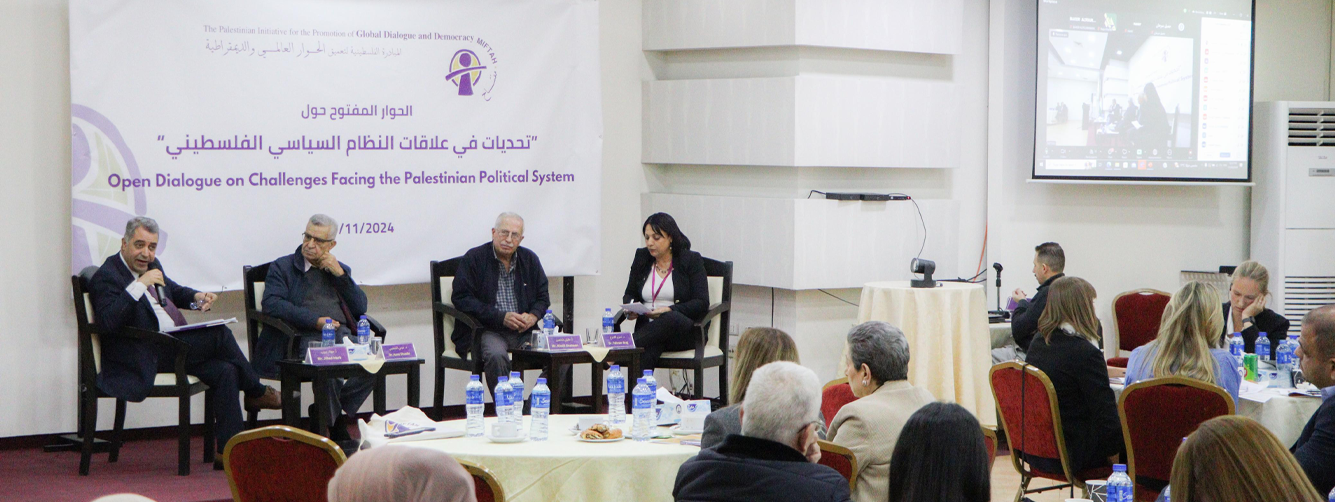
Ramallah – On April 14, MIFTAH capped off a two-day workshop in Jericho entitled: “Evaluation and follow-up tools for implementing the LGU gender charter “ in coordination with the Gender Forum in Local Governance with participation from forum member institutions. The workshop was conducted with support from GIZ and on commission from BMZ (Federal Ministry for Economic Cooperation and Development) as part of the “Empowering Women in decision –making in the Middle East (LEAD)”project. This is part of MIFTAH’s project “Men and Women towards the institutionalization of gender equality in local governance”, which is aimed at promoting an enabling inclusive environment for integrating gender in local government policies.
The workshop falls within MIFTAH’s strategies to promote a participatory approach in working with Civil Society organizations and partners in a way that encourages dialogue interaction and consultations to enrich the exchange of knowledge and develop mechanisms for social accountability and follow-up on the performance of relevant parties. It is especially aimed at reaffirming the gender perspective in follow-up and evaluation of the performance of those in places of responsibility regarding their commitment to taking the necessary measures for achieving justice, satisfaction and equity and in meeting the needs of various social sectors, especially marginalized, excluded or less fortunate ones.
A complementary plan
Monitoring and Evaluation specialist, Rasha Salah Eddin stressed on the importance of the workshop and the training it offered to the gender forum members. “The significance of this training workshop is that it is a complementary plan to the efforts of the Gender Forum in Local Governance, which aims to promote the principles stipulated in the gender charter. It is also a major shift from being an ethical charter signed by LGUs to taking on a binding and mandatory nature for its signatories. This was achieved through its measurement tools for identifying gaps in the commitment of LGUs implementation to this charter. Furthermore, it aimed to develop operational procedures for internal policies and measures for LGUS that promote abidance to the charter’s criteria. It should be mentioned that this evaluation of commitment to the gender charter is part of a systematic mechanism and unified standards considered the first of their kind in the Arab world.”
Regarding the training’s outcome, Salah Eddin said, “The training resulted in identifying a framework for monitoring LGUs performance in following Gender mainstreaming . It also resulted in an analysis and review of the assessment criteria for the extent of compliance to the law as represented by the minimum ceiling of requirement for promoting gender in local governance. The criteria offers a group of best practices which the forum is looking to develop and promote before turning them into binding legal material for all LGUs, she said, adding that “at the end of the training, a vision was put in place for following up on the achievements regarding the charter, including reaching an understanding with the relevant parties on the methodology for its implementation and the roles to be played by the parties proposed to the evaluation committees.” She said the forum would work to create opportunities for developing moral and material incentives for LGUs committed to the charter’s criteria.
Meanwhile, Lubna Al Ashqar from the Women’s Affairs Team and coordinator for the Gender Forum in Local Governance, pointed to the achievements of the training workshop in strengthening the capabilities of the forum’s institutions. “The workshop was important in that it worked on capacity-building for the forum’s institution in terms of creating special indicators for its strategic plan for the next three years. This is in addition to creating indicators for measuring the implementation of the gender charter in local government, which MIFTAH and the forum are both working on.
Mechanisms and issues
Regarding the mechanisms that could be adopted to achieve this goal, Al Ashqar said, “The mechanisms are ones for monitoring and pressing for policy changes and for monitoring the extent of implementation of the charter’s articles by the Ministry of Local Government and LGUs. This is aimed at improving the role of women in these LGUs.” She added, “Some of the most important issues discussed and which constitute a challenge for members is the issue of the elections law, the work conditions for women in local councils and the hurdles they face at their jobs because of the culture among its members and the discrimination against women. This includes the timing and circumstances of the meetings and the extent to which gender issues are integrated in topics and services provided by municipalities in addition to the means of constructing regulations that guarantee implementation and the active participation of women.”
Sahar Qawasmeh also offered her assessment of the workshop. “It was useful, valuable and rich with information. We were introduced to the tools used to monitor the specific services delivery in our society and in marginalized areas; it also helped to enable forum member institutions to address developed reform policies for putting more pressure on the government through the gender charter for holding the government accountable to enhance their commitment towards better responds to gender needs.”
On her part, MIFTAH project manager Najwa Yaghi said the workshop was held as part of MIFTAH’s strategic approaches in influencing public policies to promote participation and social accountability and thereby contribute to supporting civil society in monitoring the performance of official institutions. She said it also promoted unifying dialogue for the relevant parties based on the outputs used by MIFTAH in preparing LGU performance indicators and promoting gender integration in their work. These indicators, she explained, were based on a report reviewing the implementation of the gender charter in LGUs, which was adopted by the Ministry of Local Governance in 2007; it was also based on the results of an opinion poll about the satisfaction of citizens (male and female) towards LGU services, which covered the West Bank and Gaza Strip.
MIFTAH continues to work on developing procedural regulations that will help to increase the chances of the gender charter being implemented, thus contributing to gender integration in local governance.










